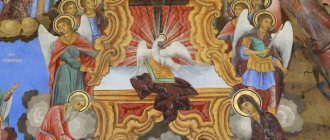No. 48 (1041) / December 16 '19
Conversations with the priest
In this topic:
Conversations with the priest
Archpriest Vasily Gelevan: You need to be honest with yourself
Conversations with the priest
Archpriest Evgeny Goryanchik: How to overcome selfishness and self-contempt?
With poverty, many passions come into human hearts, one of them is the passion of theft. What is sin anyway?
– Sin is a violation of the Divine will, a violation of a commandment, lawlessness. In a broad sense, sin is any act that is not pleasing to the Lord and can cause harm or damage to one’s neighbor. Accordingly, it contradicts the inner voice of the person’s conscience. Therefore, in any sin we can notice two sides - objective and subjective.
Undoubtedly, there are church law, state laws that condemn certain crimes, and norms of human morality that subject certain offenses to public condemnation. But there is also a voice of conscience inside a person, denouncing him if he does evil, even if no one sees or knows it.
Why is stealing a sin? You said that sin is a crime of the law, commandments and inner conscience; Does theft have all these components?
- Of course have. Theft is one of the most serious sins that a person can commit against his neighbor.
We can reason as follows. When a person works by the sweat of his brow (according to God’s commandment), he earns money, and with it he acquires what is necessary, useful for life—what he needs. And suddenly someone secretly steals it from him - commits theft, the sin of theft. Undoubtedly, not only an object of material value is stolen from a person: in the broad sense of the word, damage is caused to the entire life of this person, because in order to acquire this thing by honest labor, he had to spend time, effort - give up part of his life so that he could have this thing . And this part of his life is stolen from him.
We can judge here by analogy. Why did the Lord accept Old Testament sacrifices? It is clear that they could not save a person from eternal death, but nevertheless they were pleasing to the Lord: a person spent part of his life raising a lamb, a kid or a calf - a person sacrificed strength, means, time to God, gave it to Him freely and for it was receiving God's blessing.
Here we can judge from the contrary: a person spent time and effort to acquire some part of property - if this is stolen from him, then part of his life is absolutely illegally appropriated. Accordingly, they no longer become only his offenders, but also enemies of God.
That is why, apparently, this sin is included at number 8 in the list of 10 commandments given by the Lord. Why is it so terrible that it is included in the 10 commandments of God?
– In the Bible, in the Book of Deuteronomy, we find the 10 commandments of Moses, where number 8 is the commandment “thou shalt not steal,” which directly prohibits any form of theft (it should be noted that such a norm exists not only in Christianity: every world religion prohibits theft).
Moreover, various forms of retribution are associated with this prohibition in different religious traditions. For example, in Islam everything is very strict - according to Sharia law, which is based on the Koran, if a person stole and his guilt is proven, his hand must be cut off because he committed the sin of theft and took someone else’s property with that hand. Moreover, this commandment is extended by the Koran to a person of any class - both poor and rich. And in Christianity, the attitude towards theft and theft is very strict - in medieval Europe almost the same norms were in effect.
Now our legislation is more humane, but this does not make the sin any less. If a person steals someone else's thing, he becomes a criminal, first of all, of the Law of God, for the Bible directly says: Whoever keeps the whole law and sins in one thing, he becomes guilty of everything - if, for example, he does not kill, but steals , he is also a criminal of the Law of God and, in addition, he is also a criminal of the civil law.
Why is it so important to God that other people's property be protected?
– The Lord secretly deigned to clothe himself with our neighbor, as the holy fathers say. Therefore, any good that we do to our neighbor, we do as if to the Lord Jesus Christ Himself, and any evil that we do to our neighbor, we indirectly inflict on God.
The Lord gave wealth and property to His servant, who, taking advantage of His blessing, acquired all this for himself. Therefore, the Lord stands guard over the interests of every person.
What is obtained by honest labor is pleasing to the Lord: He sees the effort expended, that it was done honestly, that no moral standards or commandments of God were violated. And if a person tries to secretly appropriate something that is not his own, then the entire order of honest, legal labor established by God, on which the entire human society is built, is destroyed. Let's imagine that we lived in a society where everyone was only thieves, no one earned an honest living, and everyone tried to steal something from each other; it would be impossible to live in such a society.
There is a stereotype that you can’t steal from a person, but you can steal from the state: “it’s nobody’s property.”
– State does not mean “nobody’s”. The state is the common cause of all people who are its citizens. What belongs to the state is our common property. Therefore, the one who encroaches on the common property also tries to illegally snatch a part that does not belong to him.
For example, a Christmas tree grows near the house, pleasing the eye of everyone who passes by it. But if one morning before the New Year we go out into the yard and see that someone cut down the Christmas tree (say, 15 centimeters from the root) and only the lowest branches remained, and he took the rest for himself - to decorate his apartment for the holiday, then this person has committed a sin: this is an atrocity, a crime. It seems that the Christmas tree did not belong to anyone in particular, it was common, nevertheless, he tried to make the common one his own, killed the plant and caused moral trauma to all the residents of the yard.
What sins can theft entail? What else can it summon from the hellish abyss?
– A lot of sins are associated with theft (as a rule, sins are connected with each other). If a person steals from another, then in the soul of the one from whom he stole, various negative emotions are aroused: the person feels annoyance, resentment, bitterness from what was stolen from him, feels condemnation - this can result in anger and irritation, and into foul language. Manifestations can be very different, but they would not exist if this thing had not been stolen from a person.
So, you made a person sin?
– Yes, you encourage him to commit some kind of sin, and he feels justified in his actions: a commandment was broken against him, a law was broken, that’s why he reacts this way.
In addition, it must be said: when a person steals someone else’s property, it will never bring him good, he will not become rich for his own good. One way or another, this will have some kind of sinful trail: demonic influence will certainly remain over the thief as long as he has robbed or stolen things - this will encourage him to commit other sins, he can squander this money in drunkenness, debauchery, or purchase them something undue, unnecessary...
We often see that representatives of the criminal world have their own sinful lifestyle: they have developed their own subculture in which they move - a community of thieves, where everything is saturated with sin: literally an atmosphere of evil, sin, in which they constantly live. It becomes their natural habitat. But there is only one end to such a path - to the bottom of hell.
Are there specific reasons that can cause the sin of theft?
- Undoubtedly. Every sin has its own specific reasons. Regarding theft, first of all it is necessary to name the sin (and passion) of the love of money: a person wants to enrich himself at the expense of another - his neighbor. The love of money can find a different way out. A person who has the passion of love of money can honestly earn for himself the benefits to which he strives, to which the interest of his soul is directed.
And there are people who want not to work, but to get everything in an easier way - laziness also takes place here: if the love of money is coupled with hard work, then a person may harm himself by working only in order to be even richer, to have more benefits, but he does not bring any harm to others, but if he steals someone else’s property, then, while bringing temporary benefit to himself, he also causes harm to those around him.
In addition, I think the sin of envy is closely related to theft: if a person sees that another has something, but he does not, then he tries to appropriate it in some way - this is an absolutely inappropriate reaction to someone else’s wealth. If you see what someone else has, but you don’t, work honestly, work harder, and you will have it too. Finally, use your abilities in an honest direction.
It seems to me that theft never occurs at the will of just one thief - always, with any crime (including any theft), there is a demonic presence, influence and suggestion. A person who constantly steals is literally in demonic possession (maybe even under the influence of some specific demon of theft, which constantly encourages him to commit new crimes, sometimes not even for the sake of money, but simply for the sake of the crime itself) - he can no longer live differently .
But the fight against this sin is still possible - what means can be used in the fight against it? Can it be cured?
– Any sin can be overcome, any passion can be eradicated from the soul if a person has sincere repentance: if he realizes his sin, repents before God of what he did before, stops committing sin - and instead does good deeds (including works of Christian charity). Then this sin can be forgiven and healed.
In order for the sin of theft to be forgiven, a person must stop it: he must stop committing it, repent at Confession before the priest, and not commit this sin again in the future.
Some people think that if they continue to commit this sin, but donate some part, for example, to a beggar, a sick person, or a familiar priest, or to a temple, God will forgive him his sins... This will not happen - for example, St. Seraphim of Sarov forbade taking donations from people who earned money dishonestly: he said that such a donation was displeasing to God, it would not benefit either the Church or people.
We talked about sin, its development, and how to fight it. Are there preventive measures? How should children be raised so that they treat other people's property correctly?
- A very important point. Psychologists have long noticed that most thieves began to steal from childhood - if in childhood they were not stopped in time, punished, or explained, then this sin further develops like a snowball, becomes larger and larger, and cases of theft become more and more frequent.
It is clear that parents should closely monitor the development of their children and, if they suddenly notice that the child has a new thing that they did not buy for him, they should ask him: “Where did you get this?” If he says that he found it (or something similar), we need to get to the bottom of the truth: as a rule, good, valuable things do not lie on the road. There are, of course, rare exceptions to the rules, but usually things are different. Therefore, if it is possible to find out that a child stole something from someone, we must demand that he return it in some way (be it overtly or secretly - whatever is more convenient) and under no circumstances use this thing.
We need to explain to him how disgusting to God and people the crime he has committed is, and if he continues to act like this, then this could ultimately lead him to prison, which often happens with thieves - sooner or later they still get caught, most of them There are also relapses: they often visit places not so remote, where the state is trying to correct them.
But still, correction must occur from within - namely through repentance, first of all before God, through the realization that this is not just a violation of the law, this is precisely sin - something that will harm you in eternity, something that will deprive you of the prospect of communion with God, stay with good people: in fact, thieves who continue to steal and maintain communication with the same, we understand perfectly well, will not inherit the Kingdom of God.
What kind of punishment from God can be here, in this life, for people who live like this?
- As life experience shows, the Lord punishes in a way that no fair state legislation will punish. There is such a popular proverb: “God waits a long time, but he hits painfully” - He expects the sinner to repent for the time being, He expects that the person will come to his senses, correct himself, stop sinning, and if this does not happen, then the person will suffer one or another punishment: either on the part of those like him, suffers retribution, or the Lord visits him with very severe sorrows - these could be incurable oncological diseases, which also leave him time for repentance (after all, cancer does not kill a person immediately), or other serious illnesses, or misfortunes associated with the health, well-being of relatives, children - the Lord chooses a vulnerable, painful sphere of life for a person in order to enlighten him, for the ultimate goal of God's Providence is the salvation of the soul, and the Lord has a plan of salvation for each of us. If we follow this plan to the best of our ability, then the harsh actions of God’s Providence are not needed to admonish us.
The Lord admonishes us in gentle ways. But if a person clearly deviates from this path (and the sin of theft is precisely a sharp deviation from the plan, a direct contradiction of God’s plan for man, a violation of the commandment), the Lord has to use more and more harsh methods. To the point that tragedies actually happen in the lives of those who encroach on other people's property.
The 10th commandment says: You shall not covet. How is it connected with the 8th - do not steal?
- The connection is close. We can even see clear parallels here. It is said: You shall not covet your neighbor’s wife, nor his ox, nor his donkey, nor anything that is your neighbor’s. If a person desires this, then he is literally one step away from theft. He, of course, can manifest this desire in different ways, it may remain unfulfilled, but even if it remains unrepentant in his soul, the sin of envy already results. And if it is realized in fraudulent schemes for appropriating someone else’s property, this is also a type of the sin of theft: a person fraudulently tries to appropriate for himself something that clearly does not belong to him, using means of communication, cunning schemes to put pressure on the person. It is clear that this is also a sin, it is forbidden by God.
So the connection is visible. And as we have already said, a person who falls into one sin (say, the sin of theft) cannot stop - he will definitely add something else to it, other more serious sins.
How to protect yourself from thieves? After all, in fact, the Lord calls us to reasoning and sobriety. Do these virtues play any role in preventive methods?
- Yes, you mentioned very correct words: reasoning, sobriety. I would add vigilance and attention to this - in many ways, victims of theft could have prevented this sin in advance (if they thought that they might be stolen) if they had been more attentive, circumspect, and careful. But, on the other hand, it is impossible to protect yourself from everything. Thieves are thieves because they know when it is easier to steal something from a person: when he is less ready for it, relaxed, less attentive - they seize the moment to commit their crime.
Of course, we need to remain sober, vigilant, and pray to God, so that He Himself, through His gracious Providence, will admonish us and protect us. We even have such a prayer in the evening rule: “Lord, deliver us from certain people, and demons, and passions, and from all other inappropriate things” - one of the prayers of St. John Chrysostom is formulated exactly this way.
I would also like to talk about these “some” who can cause us targeted harm. There is such a Ukrainian word “villain” - villain, which literally means: “criminal” - someone who commits a crime and deliberately, deliberately wants to cause you harm. These are precisely evil people who, first of all, feel evil towards their neighbor: they do not feel love for their neighbor (this is probably the most important root of sin, and theft, and other sins, but now we are talking about this - it is clear that a person, who loves his neighbor will not steal anything from him, understanding that if he steals something from him, he will cause him suffering. If he loves this person, he will never cause him suffering).
The sin of theft is, first of all, the sin of dislike, contempt, hatred, and neglect of one’s neighbor. It seems to me that the main thing for which the Lord punishes thieves is not even the appropriation of material values, not the taking of them by dishonest means, but for the manifestation of the sin of dislike, neglect, and hatred of one’s neighbor.
God bless you, Father Dimitri, for an interesting and important conversation. We say goodbye to you, dear brothers and sisters. God help you, guardian angel!
Recorded by: Taisiya Zykova
You can view or listen to the full version of the program on the website of the Soyuz TV channel.
In other rooms:
Our mom has long arms
Applications by Maria Sosnina
Perhaps someone will now think that senseless and merciless theft of this kind was characteristic only of Soviet people. But alas... A friend told me how during a recent Moscow hurricane a tree fell on their car, crushed the roof and broke the rear window. While they, having heard the howl of the “alarm”, were descending from the sixth floor, a woman passing by with two small children pulled out a large teddy bear, which was lying behind the backs of the seats, through a broken window. She pulled it out and gave it to her children. A neighbor saw this through the window and later told the owners. Just imagine - a hurricane is knocking down trees around you, you have two small ones next to you, and in front of their eyes you are climbing into someone else’s car for a cheap toy. Until the owners arrived.
Applications by Maria Sosnina
I think it will be worse than Dovlatov’s cement, Uncle Kolya’s electrodes and my cactus combined. And no explanations will explain anything here. There's nothing to talk about here. This is not about words anymore.
This is probably why the Lord gave us “thou shalt not steal” precisely as a commandment, as an iron, inviolable rule that is not subject to discussion. If you want to be God's, do it. If you don’t fulfill it, continue to play mischief with the hitherto unknown inhabitants of metaphysical darkness.
All commandments essentially only outline the boundaries of our humanity, beyond which likeness to God ends and likeness to the devil begins. The commandments protect the space in the human soul in which our love for God and for other people can flourish. If you violate even one of them, icy satanic indifference will immediately pour into this sunlit meadow, freezing out all living things and turning you into a heartless creature. Capable, for example, of indifferently observing the suffering of the poor fellow from whom you have just stolen something absolutely unnecessary to you.
When can you go to confession?
Confession is God's sacrament in which people ask for pardon for their sinful soul. Before going to church for the first time, think and reflect on what vices have been carried out over the past days or years, starting from the age of 7. In order not to get confused, write down all the sins you have committed on a piece of paper. So that later at the sacrament before the Lord you don’t get confused in words.
There is no need to rewrite the sample of sins for confession, as it is written in the source. Write and add in your own words. For example: “blasphemy, superstition” is not correct. There will be no benefit from such a confession and the priest will not be able to understand what exactly help is needed. It would be correct: “We told jokes about God and laughed in response, I believe in omens, and repeatedly visited psychics.” Then, in this case, the priest will be able to give advice and ask the Lord to forgive sins.
Thomas Aquinas Summa Theologica
This contradicts
Augustine said that “[the so-called] “apostolates” with extreme arrogance adopted this name for themselves because they do not allow into their communities people who are married or have any property, although the same are monks and clergy, of whom in the Catholic Church a lot." The reason that these people became heretics was that, having separated themselves from the Church, they thought that those who enjoy the use of the above-mentioned things, of which they themselves are deprived, have no hope of salvation. Therefore, it is wrong to say that a person has no right to own property.
What do you need to repent about?
Summing up the topic “Confession. How does this sacrament work?” it is necessary to familiarize yourself with the most common sins in our modern world.
Sins against God - pride, lack of faith or unbelief, renunciation of God and the Church, careless performance of the sign of the cross, failure to wear a cross, violation of the commandments of God, taking the name of the Lord in vain, careless fulfillment of prayer rules, failure to attend church, prayer without zeal, talking and walking in church during services, belief in superstitions, turning to psychics and fortune tellers, thoughts of suicide, etc.
Sins against one's neighbor - grief of parents, robbery and extortion, stinginess in alms, hard-heartedness, slander, bribery, insults, barbs and evil jokes, irritation, anger, gossip, gossip, greed, scandals, hysteria, resentment, betrayal, betrayal, etc. d.
Sins against oneself - vanity, arrogance, anxiety, envy, vindictiveness, desire for earthly glory and honors, addiction to money, gluttony, smoking, drunkenness, gambling, masturbation, fornication, excessive attention to one's own flesh, despondency, melancholy, sadness etc.
God will forgive any sin, nothing is impossible for him, a person only needs to truly realize his sinful deeds and sincerely repent of them.
How to prepare for confession
In all Orthodox churches and temples, services are held on holidays and weekends. Before confession, it is advisable to read the canon. It is also worth understanding that confession should be sincere. In another case, there is no meaning from the usually read list of sins before the priest. If you have a feeling of guilt before God for your wrongdoings, then you definitely need to go to church and confess.
The most serious sins against Jesus are recorded in Scripture. There are also prescribed sins for confession for women:
- rare visits to temples;
- intimacy before marriage;
- visiting fortune tellers and clairvoyants;
- wearing revealing clothes;
- abortions.
- belief in omens;
- refusal to help a neighbor;
- drug use;
- fear of growing old.
The stronger sex should take this issue especially seriously, because it is the man who is the head of the family and an imitation for the future generation. Sins for confession for men are also prescribed:
- theft;
- refusal to help one's neighbor;
- physical force directed at others;
- hex;
- mockery of a weak person;
- laziness and greed;
- mistrust;
- craving for temptations;
- self-love.
If this is not the first time you have to confess, then you do not need to repeat previously confessed sins. The Lord God cleanses the soul and there is no point in repeating the same offense twice.
Confession procedure
In church, a lot of people usually gather for confession, and before approaching the priest, you need to turn your face to the people and say out loud: “Forgive me, a sinner,” and they will answer: “God will forgive, and we forgive.” And then it is necessary to go to the confessor. Having approached the lectern (a high stand for a book), crossed yourself and bowed at the waist, without kissing the Cross and the Gospel, bowing your head, you can begin confession.
There is no need to repeat previously confessed sins, because, as the Church teaches, they have already been forgiven, but if they were repeated again, then they must be repented of again. At the end of your confession, you must listen to the words of the priest and a prayer of permission. When he finishes, cross himself twice, bow at the waist, kiss the Cross and the Gospel, and then, having crossed himself and bowed again, accept the blessing of his priest and go to his place.
How to correctly name sins in confession
"Save me, God!". Thank you for visiting our website and before you start reading the necessary information, we ask you to look at our Instagram page “Lord, Save and Preserve†” - link https://www.instagram.com/spasi.gospodi/. Go ahead and watch it please. The community already has more than 48,000 subscribers and like-minded people. If you like our group, please subscribe to it. We post rare Orthodox prayers from the prayer book, sayings of saints, and timely post useful information about holidays and Orthodox events. Guardian Angel to you and have a nice, blessed day! (advertising information)
Every believer is a sinner, because people are weak in spirit before temptation. When you want to remove the burden from your soul, you should go to confession in church. To learn how to correctly name sins in confession, there is a lot of literature that can be found in churches and monasteries.
Treasury of Spiritual Wisdom
During the life of Saint Andrew, Christ the Fool for the Fool's sake, there lived in Constantinople a fierce sinner who robbed the dead. One day, having learned about the burial of a maiden, the daughter of a nobleman, in a secluded place, he went to her grave in order to remove her precious clothes. On the way, Saint Andrew met him and, foreknowledge of the wicked deed, they began to persuade him not to do this, otherwise he threatened with God's punishment. Instead of obeying the saint, he only laughed at him and went where he had planned. Having rolled away the stone from the cave in which the girl was buried, he opened her coffin, took off her shroud, then her precious clothes, and finally, he was not ashamed to completely expose her - he took the last shirt. But at the very time when he was finishing his vile deed, by the command of God, the deceased rose from the coffin and hit him in the face with her right hand, and he immediately lost his sight. “Damned! - she said. “If only out of shame you left me the last of your clothes.” But now you will never steal! And from this day you will know that there is God, Jesus Christ lives, there is Judgment and there will be reward after death.” After this, the blind thief, willy-nilly, abandoned his craft and began to feed on alms. He often reproached himself cruelly for his former life. “Damn you,” he would sometimes say, “my insatiable greed, for your sake I received this terrible blindness. It is bad for him who lives in idleness and engages in theft” (113, 101-102).
The essence of confession
The Holy Fathers call the Sacrament of Repentance the second baptism. In the first case, at Baptism, a person receives cleansing from the original sin of the ancestors Adam and Eve, and in the second, the repentant is washed from his sins committed after baptism. However, due to the weakness of their human nature, people continue to sin, and these sins separate them from God, standing between them as a barrier. They are unable to overcome this barrier on their own. But the Sacrament of Repentance helps to be saved and to acquire that unity with God acquired at Baptism.
The Gospel says about repentance that it is a necessary condition for the salvation of the soul. A person must continuously struggle with his sins throughout his life. And, despite any defeats and falls, he should not become discouraged, despair and grumble, but repent all the time and continue to carry his life’s cross, which the Lord Jesus Christ laid on him.
Awareness of your sins
In this matter, the main thing is to understand that in the Sacrament of Confession, a repentant person is forgiven all his sins, and the soul is freed from sinful bonds. The ten commandments received by Moses from God, and the nine Beatitudes received from the Lord Jesus Christ, contain the entire moral and spiritual law of life.
Therefore, before confessing, you need to turn to your conscience and remember all your sins since childhood in order to prepare a real confession. Not everyone knows how it goes, and even rejects it, but a true Orthodox Christian, overcoming his pride and false shame, begins to spiritually crucify himself, honestly and sincerely admit his spiritual imperfection. And here it is important to understand that unconfessed sins will lead to eternal condemnation for a person, and repentance means victory over oneself.
How to repent of sins in confession
After the service has passed, all the people line up to see the priest to atone for their sins. Having waited for their confession, they first say: “Forgive me, a sinner.” Having heard the answer: “God will forgive, and we forgive,” you can approach the priest. In front of the lectern they lower their heads and cross themselves. Having bowed, they begin their confession with the words: “I sinned in...”. If you have a piece of paper, you can look at the sins written down in advance so as not to get confused.
Be sure to write a list of sins in confession in your own words, and not just in the words of the Lord. After listing your vices, you should listen to the minister. If the sins are too serious, the priest may give punishment in the form of long prayers or abstinence. Having repented of the vice you have committed, ask the Lord for repentance and alms. Before leaving, be sure to cross yourself and kiss the cross, then bow before the holy book of the Gospel.
What is real confession? How does this sacrament work?
Before confessing to a priest, you need to seriously prepare and understand the necessity of cleansing your soul from sins. To do this, you need to reconcile with all the offenders and with those who were offended, refrain from gossip and condemnation, any indecent thoughts, watching numerous entertainment programs and reading lightweight literature. It is better to devote your free time to reading the Holy Scriptures and other spiritual literature. It is advisable to confess a little in advance at the evening service, so that during the morning Liturgy you will no longer be distracted from the service and devote time to prayerful preparation for Holy Communion. But, as a last resort, you can confess in the morning (mostly everyone does this).
For the first time, not everyone knows how to confess correctly, what to say to the priest, etc. In this case, you need to warn the priest about this, and he will direct everything in the right direction. Confession, first of all, presupposes the ability to see and realize one’s sins; at the moment of expressing them, the priest should not justify himself and shift the blame onto another.
Confession: how to correctly name your sins in confession, priest’s advice
In principle, there are no sinless people: the Bible, the church and common sense speak about this. A person who visits God’s temple more than once a year probably knows how important confession is for an Orthodox Christian: how to correctly name one’s sins in confession - the priest’s advice will help answer this question.
A person comes first of all with repentance and awareness of his sins . If you don’t know what sins to name, turn first to church literature. Read the books “Interpretation of the Gospel” by B.I. Gladkov or “Helping the Penitent” by St. Ignatius Brianchaninov . However, one should not get carried away with this useful literature in all respects.
During confession, you should not pour out church words and terms with all your might, behave too pretentiously, or, conversely, too petty, naming all the slightest sins and mistakes. Confession is a great spiritual work , and one should do it throughout one’s life. We come to confession to expose our sin to God, to repent and realize the ugliness of our sin.
What sins do people commit on earth?
Every day life presents us with trials and temptations. Many people do not even suspect that they are sinning. But not knowing the commandments of the Lord does not remove one from responsibility before God. The most serious sins:
- against the Lord God;
- against neighbors;
- against your own soul.
A more detailed description of sins can be found in the Holy Scriptures. Before confession you need to prepare. If possible, you can find out the details of the sacrament and an example of sins during confession from the priest. After all, the Lord God gave the authority to His Archangels to forgive the vices of sinners. And they, in turn, to the priests. Worshipers are conductors of Jesus Christ.
Commandment; Don't steal
What could be simpler is not yours, don’t touch it. Sometimes it seems to us that the office at work is a draw, and it’s okay if we take a couple of pieces of paper or a pen. Everyone is used to cooks stealing food home from catering establishments without paying for it, and this has become the norm, and eating for free at work is not discussed at all.
Riding as a “hare” on public transport and not being caught by the inspector is almost a feat. The eighth commandment prohibits appropriating what does not belong to you, for violating this decree entails violating the second commandment, “Love your neighbor,” and here is already one step closer to honoring God.
Reply to objection 2
. The punishments of this life are medicines rather than punishments. Indeed, [“we know” that] for the retribution of sinners “truly there is the Judgment of God” (Rom. 2:2). Therefore, in accordance with the judgment of this life, not every mortal sin is punishable by death, but only that which causes either irreparable damage or is associated with some disgusting vice. Thus, the current court does not sentence a thief who does not cause irreparable damage to death, except in cases where the theft is aggravated by some accompanying circumstance, for example, blasphemy, that is, theft of something sacred, embezzlement, that is, theft of public property, as Augustine writes, and the theft of people, for which they must be put to death (Ex. 21:16).
You may like => Directions Using the Social Card of a Muscovite in the Moscow Region
Objection 3
. Further, he who takes what belongs to him does not seem to commit a sin, since, while maintaining equality, he does not act against justice. However, a person commits theft even when he secretly takes his own property that is being held or guarded by another. Therefore, it appears that stealing is not always a sin.
Participle
They usually confess in order to receive communion, and for this they need to pray for several days, which means prayer and fasting, attending evening services and reading at home, in addition to evening and morning prayers, the canons: Theotokos, Guardian Angel, Repentant, for Communion, and, if possible , or rather, at will – Akathist to the Sweetest Jesus. After midnight they no longer eat or drink; they begin the sacrament on an empty stomach. After receiving the Sacrament of Communion, you must read prayers for Holy Communion.
Don't be afraid to go to confession. How is it going? You can read accurate information about this in special brochures that are sold in every church; everything is described in great detail in them. And then the main thing is to tune in to this true and saving work, because an Orthodox Christian always needs to think about death so that it does not take him by surprise - without prayers of repentance and communion.











